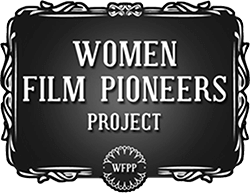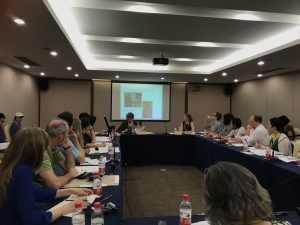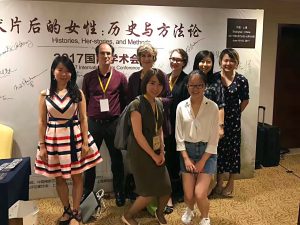← News Archive
CFP: Doing Women’s Film and Television History IV: Calling the Shots-Then, Now, and Next
CFP: Doing Women’s Film and Television History IV:
Calling the Shots – Then, Now, and Next
University of Southampton, May 23-25, 2018
Organizing team: Shelley Cobb, Linda Ruth Williams, and Natalie Wreyford
Proposals due November 3, 2017
As researchers of the AHRC-funded project Calling the Shots: Women and Contemporary UK Film Culture 2000-2015 we are proud to host the fourth International Doing Women’s Film and Television History conference in association with the Women’s Film and Television History Network – UK/Ireland.
The focus for DWFTH-IV is predicated on the idea of the contemporary as an historical formation. The conference will offer a space to think about the interconnectedness of the past, present and future in feminist historiography and theory, as well as across all forms of women’s film culture and filmmaking. It will also consider women’s film and television histories and their relationships with the contemporary, framed and read historically, to reflect on our methodological, theoretical, ideological and disciplinary choices when researching and studying women and/in film and television. In addition to this theme, we are interested in proposals/panels on all topics related to women’s film and television history, from all eras and from all parts of the globe. We hope that DWFTH-IV will build on the successes of the previous conferences through new work on women, both historical and contemporary, and fresh thinking on what we mean by women’s film and television history.
Calling the Shots is producing important new research on women in cinema now, through interviews, data analysis and writing. We are finding and recording all the women who have been employed in six key roles in British film production since 2003. We are interviewing over 50 of these women thereby producing a record of their involvement and achievements. The scale and forensic detail of the project shows both what they have done and where they have been excluded. Since its inception, Calling the Shots has been affiliated with WFTHN-UK/Ireland, and in doing our research we continually reflect on how contemporary study both relies on historical precedents and develops new models for thinking and working historically, while being focused on the present.
Keynote speakers TBD
(The conference will include screenings with special guests, as well as sessions with film and television practitioners and other industry professionals.)
Papers are invited on any aspect of women’s work in, consumption of, and relationship with film and television. The following is an indicative (and by no means exhaustive) list of possible topics:
• women’s film/TV historiography: filling gaps or changing history?
• history formulated as in medias res: how do we do contemporary history, and what are the implications of thinking of the historical in this way?
• methodologies: archive searches, data collection (uses, limitations, difficulties collecting); interviews with practitioners; creative/cultural industrial approaches
• the impact of social, economic and industrial conditions (including industry regulation) on women’s roles and creative practices
• new ways of doing textual analysis of women’s films (rethinking feminist theory?)
• re-thinking women as ‘auteurs’ of film and television (directors, showrunners, producers, actors)
• feminism & women’s film history; historicizing women’s film collectives of 1970s and 80s; feminist filmmaking today (and tomorrow?)
• international and transnational contexts: connections, comparisons, collaborations, migration
• crossing industry boundaries: film, television, theatre, radio, journalism, art, etc
• practice-based research: directing, screenwriting, sound/set/costume design, etc
– the relationship between practice-based research and history
• women audiences/viewers and women as fans
• women campaigner/activists in film and television and for on-screen/off-screen change
• women’s film criticism/women film critics
• the uses of social media by women filmmakers/showrunners/actors/critics/fans/campaigners etc
• digitisation in women’s filmmaking and future histories
• ‘women’s cinema’ as critical category in post-feminist contexts
• women’s independent filmmaking and/versus women’s mainstream (or blockbuster) directing
• changing the curriculum: critical canons, teaching & film programming; pedagogies of women’s film and television history; teaching feminist history and theory; including women’s film and television in core modules/classes
• the relationship between film and television genres, their gendered affiliations and women’s involvement in their production
• women practitioners’ negotiations of femininity and/or feminism in their working lives
• the intersection of class, race, sexuality, disability and women both on screen and behind the camera
• issues of archiving and preservation for women’s film and television
• distribution and exhibition and broadcasting – finding and seeing women’s film and television
Proposals for twenty-minute presentations must include the title of the presentation, a 250-word abstract and a brief biography the author(s). Pre-constituted panels of three speakers may also be submitted, and should include a 250-word panel rationale statement, as well as individual abstracts. Proposals from both established scholars and early career researchers including postgraduate students are welcomed. Proposals should be submitted to dwfth4@gmail.com before the 3 November 2017. Participants will receive a response from the selection committee before 20 December 2017.
More information on Calling the Shots can be found here.
More information on the Women’s Film and Television History Network – UK/Ireland can be found here.


